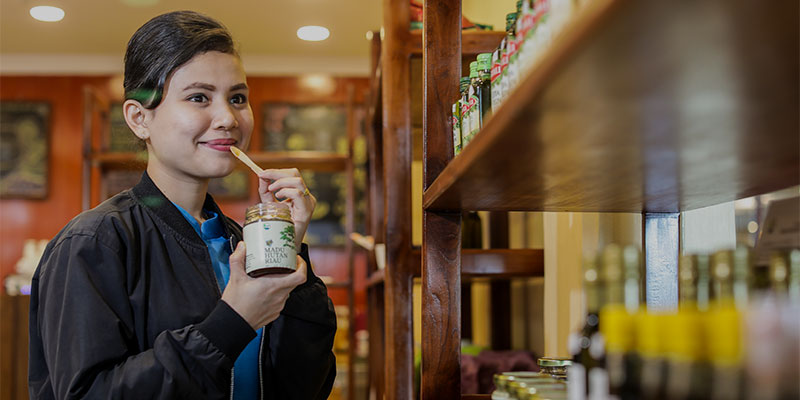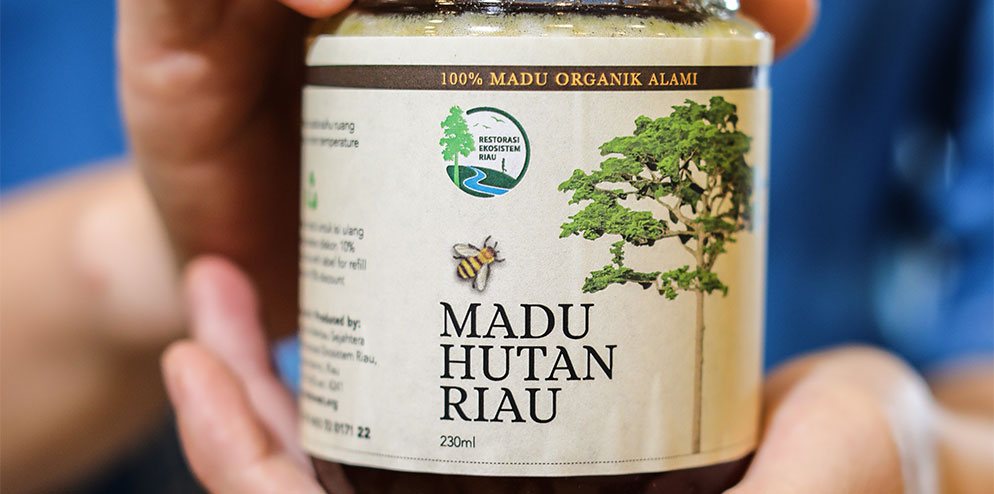Community participation and sustainable economic activity is a vital aspect of environmental and biodiversity conservation on the Kampar Peninsula.
In 2017, RER began partnering with local honey harvesters from the Kampar Peninsula and Padang Island. The honey harvesters are ethnic Melayu people with long-standing ties to the peat forests of Riau. For generations, they have harvested honey in traditional ways by free climbing giant forest trees known as Sialang (Koompassia excelsa) to collect honey for their own use and sell or trade to others in their community.
Local communities regard the Sialang trees as a protected tree species and collection of Sialang honey is a long-standing cultural and family tradition that involves significant skill and bravery. It is also seen as an ethnic ritual. Honey collection is a seasonal activity that varies from year-to-year, based upon weather and health of the forest, therefore resulting in fluctuating production quantities.
The Sialang trees are relied upon as a source of income for local villagers, but often exploited by agents who purchase large quantities of honey and re-sell at higher prices, pocketing the profit, without sharing with the local community. RER is working to assist the honey harvesters and the communities in which they live by purchasing honey, marketing and selling the product as Madu Hutan Riau, and returning the profits back to the community in the form of projects or infrastructure that all can share and benefit from.

Madu Hutan Riau is natural raw honey that is directly extracted from Sialang tree beehive. The colour of the honey ranges from light red to black and is triple strained through a combination of rattan and mesh screens: once in the forest and twice more before bottling to remove wax, bee wings and other unwanted solids. No cooking, pasteurisation or sterilisation is used.
Riau Forest Honey is the natural and organic honey traditionally collected from the lowland tropical rainforest in Kampar Peninsula and Padang Island, Riau Province, Sumatra.
The Sialang tree is a majestic and iconic wild tree that grows in lowland tropical rainforests near the Equator in Southeast Asia. Its base can exceed two meters in diameter and it is the tallest tree species in the forest, often reaching a height of 80 meters.

The Asian giant bee (Apis dorsata) is the largest honey bee species in the world and develops large hives of forest honey on the underside of Sialang tree branches which extend broadly and can exceed 50-cm in diameter. The bees collect pollen from hundreds of different sources in and around the forest, creating the unique nectar which defines the distinctive taste of natural, raw Sialang forest honey.
RER’s Madu Hutan Riau is fast becoming a popular product. It supports local honey harvesters in protecting, restoring and utilising the forest in a sustainable manner. It also contributes to improving the well-being of communities through pro t-sharing; and provides health benefits to the many consumers who purchase Madu Hutan Riau.